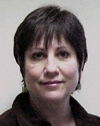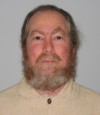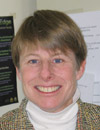D-Lib Magazine
|
Johan Bollen
Johan Bollen is Assistant Professor at the Computer Science department of Old Dominion University, which he joined in 2002. He worked at the Free University of Brussels for the Principia Cybernetica project as an Assistant Editor/Researcher from 1994 to 1999, after which he joined the Active Recommendations Project of the Los Alamos National Laboratory Research Library in 1999. His work focuses on the development of algorithms for adaptive information linking from temporal patterns of user retrievals. His research has found applications in the prediction of human hypertext navigation paths, the construction of large document networks, novel digital library recommendation systems and the evaluation of document and journal impact.
To return to Johan Bollen's article, click (here).
Su-Shing Chen
Su-Shing Chen is Professor of Computer Information Science & Engineering, Genetics Institute and McKnight Brain Institute, University of Florida-Gainesville. He received his Ph.D. from the University of Maryland in 1970. He is also Emeritus Professor, Computer Engineering & Computer Science, University of Missouri-Columbia, Advisory Professor of Shanghai Jiao Tong University and Visiting Professor of Xian Jiao Tong University in China. He was the Program Director, NSF Information Tech & Organizations Program, and Program Director, NSF/ARPA/NASA Digital Libraries Initiative, May 1994-Aug. 1995. Before that period, he was Program Director, Knowledge Models & Cognitive Systems Program, NSF, 1991-94, and Program Director, Intelligent Systems, NSF, 1984-1985. He has published several papers in digital libraries and authored the book, Digital Libraries: The Life Cycle of Information, 1998, BE Publisher.
To return to Su-Shing Chen's conference report, (here).
Nancy Fried Foster
Nancy Fried Foster is Lead Anthropologist for the University of Rochester's River Campus Libraries and co-manager of the Libraries' Digital Initiatives Unit. She conducts research on faculty, staff, and students to document work habits and identify needs for web-based products to support research and writing. Before joining the library staff, Nancy conducted research in small indigenous communities in Brazil and Papua New Guinea as well as in educational, commercial, and not-for-profit organizations in the United States and England.
To return to Nancy Fried Foster's article, click (here).
Sean Fox
Sean Fox is the technical lead at the Science Education Resource Center at Carleton College (SERC). He is responsible for the direction and development of the technical infrastructure that underpins the websites hosted by SERC. He is a participant in the NSDL Technical Committee including involvement in their webmetrics pilot. His professional interests center on how to appropriately align the affordances of information technology with the needs of educators. Prior to joining SERC he was the Academic Computing Coordinator for the Natural Sciences at Carleton College.
To return to Sean Fox's article, click (here).
Susan Gibbons
Susan Gibbons is Assistant Dean for Public Services & Collection Development at the University of Rochester, River Campus Libraries. She holds an MLS and MA in History from Indiana University and a professional MBA from University of Massachusetts, Amherst. She has published and presented on various library information technology topics, including institutional repositories, electronic books and library course management systems. Most recently she authored a Library Technology Report on "Establishing an Institutional Repository" and is presenting a full-day workshop on the subject as part of the Library and Information Technology Association's (LITA) Regional Institute series.
To return to Susan Gibbons' article, click (here).
Ellen Iverson
Ellen Iverson is an evaluator and programmer at the Science Education Resource Center at Carleton College. Her work includes the usability and evaluation efforts that ground SERC projects and websites in the reality of educator practice. Her professional interests include understanding how faculty use the web and digital libraries in their class preparation, and the assessment of these resources. Prior to her work with SERC she spent 14 years in industry working with IBM and as the Technology Manager for Marathon Multimedia.
To return to Ellen Iverson's article, click (here).
Thomas Lipkis
Thomas Lipkis is Senior Software Architect of the LOCKSS program at the Stanford University Libraries, where he is primarily responsible for leading the design and implementation of the production LOCKSS system. His background includes work in operating systems, knowledge representation, manufacturing, communications and embedded systems.
To return to Thomas Lipkis' article, click (here).
Cathy Manduca
Cathy Manduca is the Director of the Science Education Resource Center at Carleton College where she is involved in a variety of projects that support improvements in geoscience and science education. Her work includes serving as a community leader, organizing workshops and other activities for faculty and educators of all types, and developing web-resources that link teaching resources, pedagogy and discussion. She is President of the National Association of Geoscience Teachers and the 2004 recipient of AGU's Excellence in Geophysical Education Award.
To return to Cathy Manduca's article, click (here).
Giridhar Manepalli
Giridhar Manepalli is a graduate student in the Computer Science department at Old Dominion University, specializing in Digital Libraries. He is presently working with Dr. Michael Nelson on the ISS and Library of Congress Project, Archive Ingest and Handling Test. He also works for Virginia Modelling Analysis and Simulation Center, under Senior Scientist Dr. Sokolowski, for the project Geographical Mapping of Simulated Agent Locations. In addition, he volunteers for the Virginia Modelling Analysis and Simulation Center for the project Disaster Management during Mass Casualty Incidents. His research interests include, among other things, digital libraries, data mining and knowledge discovery, networking concepts, and artificial intelligence.
To return to Giridhar Manepalli's article, click (here).
Suchitra Manepalli
Suchitra Manepalli is presently pursuing graduate studies in Computer Science at Old Dominion University. She completed her B.S. in Computer Science and Management from Old Dominion University in 2002. In addition to her studies, she is currently working at the Virginia Modelling Analysis and Simulation Center, under Senior Scientist Dr. Sokolowski, on a grant proposal for the Department of Defense on the Agent Simulation and Artificial Intelligence technologies related to Disaster Management during Mass Casualty Incidents. Her research interests include digital libraries, data mining and knowledge discovery, machine learning and expert systems.
To return to Suchitra Manepalli's article, click (here).
Seth Morabito
Seth Morabito is a member of the LOCKSS team at Stanford University Libraries. As a software engineer, his primary focus is on designing and implementing new features for the LOCKSS system. Seth has worked for a number of leading companies in the collaborative and web spaces, and practices bookbinding in his spare time.
To return to Seth Morabito's article, click (here).
Giridhar Nandigam
Giridhar Nandigam is a graduate student Old Dominion University. His current research interests includes information retrieval, knowledge discovery and peer-to-peer technologies. He is currently working under Dr. Levinstein (assistant chair of CS-ODU) on an NSF project that involves the study of Interactive Strategy Trainer for Active Reading and Thinking. He is one of the active members of the Artificial Intelligence Initiative.
To return to Giridhar Nandigam's article, click (here).
Michael L. Nelson
Michael L. Nelson received his B.S. (1991) in computer science from Virginia Tech and his M.S. (1997) and Ph.D. (2000) in computer science from Old Dominion University. He worked at NASA Langley Research Center from 1991-2002. Through a NASA fellowship, he spent the 2000-2001 academic year at the School of Information and Library Science, University of North Carolina at Chapel Hill. In July 2002, he joined the Computer Science Department, Old Dominion University.
To return to Michael L. Nelson's article, click (here).
Thomas S. Robertson
Thomas S. Robertson earned his B.S. in Symbolic Systems from Stanford University. He is the Assistant Director and Technical Manager of the LOCKSS Program at the Stanford University Libraries. He has been with the LOCKSS Program since 2001. He is currently working to build a technical community around the LOCKSS software and to make LOCKSS work with existing technologies including OAI-PMH (Open Archives Initiative Protocol for Metadata Harvesting). Before joining the LOCKSS Program he worked at HighWire Press.
To return to Thomas S. Robertson's article, click (here).
David Rosenthal
Dr. David Rosenthal is Senior Scientist of the LOCKSS program at the Stanford University Libraries. He is investigating peer-to-peer techniques for fault and attack resistance. David joined Sun Microsystems in 1985 from the Andrew project at Carnegie-Mellon University, where worked to develop both NeWS and the X Window System, now the open-source standard. David left Sun in 1993 to be Chief Scientist and employee #4 at Nvidia, the leading supplier of high-performance graphics chips for the PC industry. In 1996 he joined Vitria Technology, a leading supplier of e-business infrastructure technology. David received an M.A. degree from Trinity College, Cambridge and a Ph.D. from Imperial College, London. He is the author of several technical publications and holds 23 patents.
To return to David Rosenthal's article, click (here).
Copyright © 2005 Corporation for National Research Initiatives
Top | Contents
Search | Author Index | Title Index | Back Issues
E-mail the Editor
doi:10.1045/january2005-authors














